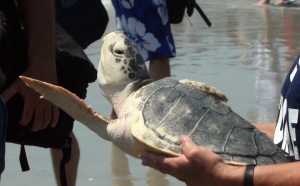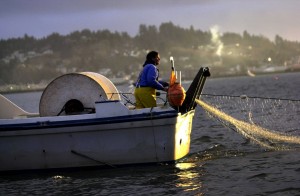 I recently attended a public hearing for a proclamation in the state of North Carolina that proposed to ban large-mesh gill nets in two areas of the state’s estuaries where sea turtle encounters have recently increased. There’s a large back story to both sides of the case and a lot of emotional motivation on both sides, leaving science flattened in the wake of charismatic leaders promoting their personal values. In fact, science became a bit of a flattened tool, left on the ground until useful to pick up and brandish, like a much-forgotten sword cast aside until it’s in a handy spot mid-battle. The meeting started as a classic jobs versus the environment case, but a few hours into the public comment period, I began to realize why this particular meeting had attracted the attendance of well over 300 people. I wasn’t in Kansas anymore, but at the crossroads of some of the largest debates in commercial fishing.
I recently attended a public hearing for a proclamation in the state of North Carolina that proposed to ban large-mesh gill nets in two areas of the state’s estuaries where sea turtle encounters have recently increased. There’s a large back story to both sides of the case and a lot of emotional motivation on both sides, leaving science flattened in the wake of charismatic leaders promoting their personal values. In fact, science became a bit of a flattened tool, left on the ground until useful to pick up and brandish, like a much-forgotten sword cast aside until it’s in a handy spot mid-battle. The meeting started as a classic jobs versus the environment case, but a few hours into the public comment period, I began to realize why this particular meeting had attracted the attendance of well over 300 people. I wasn’t in Kansas anymore, but at the crossroads of some of the largest debates in commercial fishing.

First, you have to understand that these meeting typically attract a few lobbyists on either side of the case – say, in this particular instance, a couple of representatives of the Coastal Conservation Association and the Jean Beasley Sea Turtle Center followed by the North Carolina Fishermen’s Association representative and a few local residents most directly affected. That’s what I expected walking into this meeting in terms of the people giving public comment. However, I was greeted kindly at the door by four policeman and then directed toward the sign-in center, where I was asked where I was from and if I wanted to make an oral comment. There were 6 police officers running this table and 4 more scattered around the room where people were finding creative places to seat themselves for the meeting. The chairs in the meeting center had long since been claimed.
The meeting started with a prayer, after which I thought to myself, ‘well, so much for separation of church and state’. Then I realized that the prayer may have been appropriate to set the mood of the meeting, which held through the entire afternoon and into the evening as collected and professional even though livelihoods and deeply held emotions were at stake. The prayer ended with a call for good behavior, setting the tone and a warning, emphasized by the police presence lining the room.
The proclamation was presented by a scientist from the state, purportedly as a combination of expertise from everyone on the panel. He backed up each aspect of the new rule with data, mostly from the observer program, as to where and when the turtles were most vulnerable. This data dictated the mesh size of allowed nets, the closure areas, and the seasonality of the closures. However, as the fishers later commented, the presentation of such a supposedly carefully crafted piece of legislation left seemingly little room for negotiation. But isn’t the point of a public comment period to allow for negotiation and compromise to better fit the needs of the community?
I actually walked into the meeting with a relatively open mind about both sides of the discussion, mostly as a citizen interested in informing myself about issues in the communities I do my research. However, I immediately realized that there wasn’t much room to sit in the middle ground philosophically. This left me a bit between a rock and a hard place. I worked last year on the legal team that threatened the suit to protect the turtles and proposed to ban gill netting. Since then, I’ve started working in a new community and have made good friends and research collaborations in the fishing towns scattered through eastern North Carolina.
At this meeting, my two worlds collided. A lawyer that I used to work with came up to me during the break, her usual talkative self and asked how things were going. Upon realizing who I was talking to (leaders in the fishing community), she clammed up and walked away. Later, I asked her how things were going, noting that she had escaped earlier. She replied that she didn’t know who I was rooting for and didn’t want to blow my cover, if that’s what was going on. And really without saying more than ‘hello’, I had planted myself in the camp of the commercial fishermen. Which, upon further thought, is an appropriate place for me but I would have liked to have the choice.

The reason I say I’m on the fishers’ side is, at it heart, entirely self-serving: I rely upon fishers for access to ecologically important areas, historical perspective, and data collection. Sure, I could get more funding to go out and investigate things by myself, but it’d be far less informative because even the most well-funded scientist can’t get out on the water all day, every day. Nor can we go back in time.
Not to mention, purely from an debate and legal argument perspective, the fishers had some critical points going for them. First, it’s perhaps the largest showing of fishers I’ve ever seen – an otherwise individual and reclusive bunch. Even old-time fishermen were commenting on the size of the gathering. Clearly, the decision was critical to their livelihoods and shouldn’t be taken lightly or without their input. Furthermore, they mounted an extremely well-planned and organized argument, sending up fisher after fisher to build on each other’s argument. They moved from the somewhat expected points like ‘this will put me out of business and I have nowhere else to go’ to arguing with specific data and linkages to the final proposal. They pointed out alternative explanations of why there is increased turtle interactions despite a shrinking commercial fleet, the lack of effort expended into better net technology, and the somewhat less tangible environmental problems at the root of the argument (water quality and coastal development affecting stocks of both fish and turtles) that had yet to be addressed. They basically testified to the fact that they understood that turtles are endangered and have a right to life, but that options with less economic and community impact should be considered before a ban during the height of fisheries season. They feel targeted and put forth a lot of evidence that makes me think they might be right.
You’ll note that very little about the biology of the estuary, flounder, or sea turtles was discussed. Fact of the matter is, little is known about the system and those in the position to discuss the proposal were not the most well-prepared to incorporate into their decision making. Most of the scientific information that was discussed actually came from the observer program and fisher reporting itself, which led to a particularly harsh sting when the reason the panel said the proposal couldn’t be changed is that it was tailored to the best available science.
~Bluegrass Blue Crab
‘Best available science’ chaps my hide at times. I’ve been on both sides of BAS (most often working with people who are making a recommendation or policy), and I’ve seen BAS mean everything from we have a pretty good idea of what’s going on to we have no idea but here’s a wild guess.
I wonder if there shouldn’t be some distinction between ‘we have real data’ a ‘knowledgeable experts made a best guess’
FTR, I have no idea what the BAS looks like in this case.